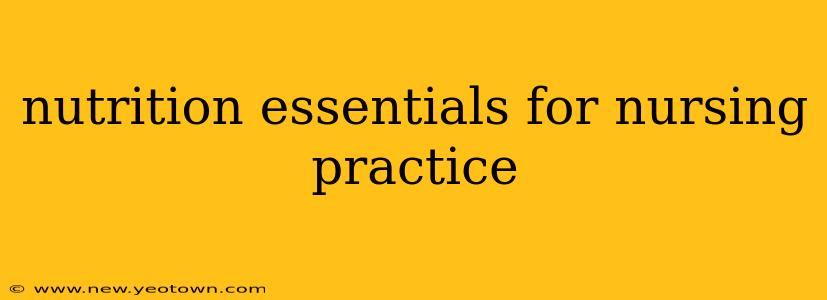The nursing profession demands stamina, sharp focus, and unwavering dedication. Long shifts, emotional challenges, and the constant pressure to provide excellent patient care can take a toll, both physically and mentally. But what many nurses overlook is the crucial role of nutrition in maintaining their well-being and effectively performing their duties. This isn't just about grabbing a quick coffee and a sugary pastry between patients; it's about fueling your body with the essential nutrients to support your demanding lifestyle and enable you to deliver the best possible care. Let's delve into the nutrition essentials for a thriving nursing career.
What are the key nutrients nurses need?
This isn't a one-size-fits-all answer, but focusing on a balanced diet rich in macronutrients and micronutrients is crucial. Think of it as building a strong foundation for your health. Your body needs energy from carbohydrates, the building blocks of protein, and healthy fats for various bodily functions. Micronutrients like vitamins and minerals then act as the essential tools that keep the whole system running smoothly.
Macronutrients: The Powerhouse Trio
-
Carbohydrates: These are your body's primary energy source. Choose complex carbs like whole grains (brown rice, quinoa, oats), fruits, and vegetables over refined carbs (white bread, sugary cereals). They provide sustained energy, preventing those afternoon slumps.
-
Protein: Crucial for building and repairing tissues, protein is essential for muscle recovery after long shifts on your feet. Excellent sources include lean meats (chicken, fish), beans, lentils, and Greek yogurt. Aim for a sufficient protein intake to support your energy levels and muscle health.
-
Fats: Don't shy away from healthy fats! They're vital for hormone production, brain function, and nutrient absorption. Focus on sources like avocados, nuts, seeds, and olive oil. These "good" fats contribute to overall well-being and can even help manage stress levels.
Micronutrients: The Unsung Heroes
Vitamins and minerals play crucial supporting roles in various bodily functions. A balanced diet typically provides sufficient amounts, but deficiencies can impact energy levels, immunity, and overall health. Consider the following:
-
Vitamin D: Important for bone health, immune function, and mood regulation. Sunlight exposure and supplementation are essential, especially during winter months.
-
Vitamin C: A powerful antioxidant that supports the immune system and helps protect against cell damage.
-
Iron: Crucial for carrying oxygen throughout the body, preventing fatigue and anemia. Red meat, spinach, and lentils are excellent sources.
-
Magnesium: Involved in over 300 biochemical reactions in the body, influencing muscle function, nerve transmission, and blood sugar control.
-
B Vitamins: Essential for energy production and nerve function, reducing fatigue and improving mental clarity.
How can I manage my nutrition on long shifts?
Long shifts can make healthy eating challenging, but planning and preparation are key.
Planning Ahead:
-
Pack smart lunches and snacks: Prepare nutritious meals and snacks in advance to avoid relying on unhealthy options at the hospital cafeteria. Think salads, whole-grain sandwiches, fruits, vegetables, and nuts.
-
Hydration is key: Carry a reusable water bottle and sip water throughout your shift. Dehydration can lead to fatigue and decreased cognitive function.
Smart Snacking Strategies:
-
Avoid sugary snacks: These provide a temporary energy boost followed by a crash.
-
Choose nutrient-dense snacks: Opt for options that provide sustained energy and essential nutrients, like Greek yogurt, trail mix, or fruit with nut butter.
What are some quick and healthy meal ideas for nurses?
Time is often a luxury nurses don't have. Here are some quick and healthy meal ideas you can easily prepare:
-
Overnight oats: Combine oats, milk (dairy or non-dairy), chia seeds, and your favorite fruits for a grab-and-go breakfast.
-
Meal prepping: Spend a few hours on the weekend preparing meals and snacks for the week.
-
Quick salads: Combine greens, protein (grilled chicken or chickpeas), and healthy fats (avocado or nuts) for a nutritious and satisfying lunch.
What are the consequences of poor nutrition for nurses?
Neglecting your nutritional needs can lead to various negative consequences:
-
Increased risk of chronic diseases: Poor nutrition increases your risk of developing heart disease, type 2 diabetes, and certain cancers.
-
Impaired immunity: A nutrient-deficient diet weakens your immune system, making you more susceptible to illness.
-
Reduced energy levels and fatigue: Lack of essential nutrients can lead to persistent fatigue and decreased performance.
-
Increased stress and burnout: Proper nutrition plays a vital role in mood regulation and stress management.
How can I prioritize nutrition in a busy nursing career?
Prioritizing nutrition might seem impossible, but small changes can make a big difference:
-
Make time for meal planning: Even 15 minutes of planning can save you time and ensure healthier choices.
-
Pack healthy snacks: Always keep nutritious snacks on hand to avoid unhealthy cravings.
-
Set realistic goals: Don't try to overhaul your diet overnight. Focus on making small, sustainable changes.
-
Seek professional guidance: If you're struggling to manage your nutrition, consult a registered dietitian for personalized advice.
In conclusion, prioritizing nutrition is not just about self-care; it’s a fundamental aspect of professional excellence in nursing. By fueling your body with the right nutrients, you'll enhance your physical and mental well-being, allowing you to provide the highest quality patient care and thrive in this demanding yet rewarding career. Remember, you can’t pour from an empty cup. Invest in your health – it's the best investment you can make.

